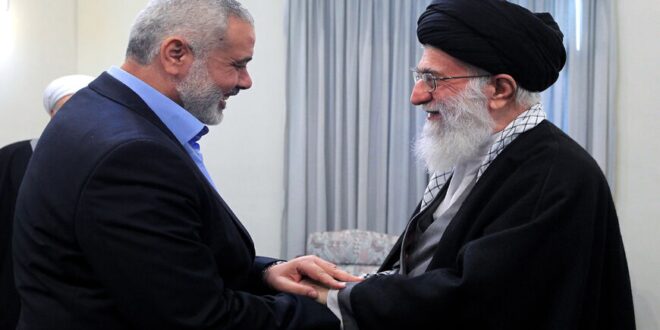Khaled al-Qaddumi claims that while the militant group and the Islamic Republic share common goals, the fighting was not instigated by Tehran.
This is not just another normal round of confrontation between the Palestinian factions in the Gaza Strip and Israel — at least this is what Hamas believes. The group’s representative in Tehran told Al-Monitor in an exclusive interview that, this time, his group along with other Palestinian factions “applied a strategic shift in the concept of resistance, from defending Gaza against Israeli attacks to defending all Palestinians living in historical Palestine.”
Khaled al-Qaddumi told Al-Monitor that another strategic change is that “the resistance will not allow Israeli occupation forces to attack civilian targets in al-Quds [Jerusalem].”
On May 6, tensions escalated when Israeli Police stormed Al-Aqsa Mosque compound, using stun grenades and rubber bullets against Palestinians protesting over the forced displacements of four Arab families from the Sheikh Jarrah neighborhood in East Jerusalem. Protests erupted in different cities inside Israel, reflecting a change in the tools Arabs are using to defend their rights. Prior to that, on May 4, the general commander of Izz ad-Din al-Qassam Brigades, Hamas’ military wing, Mohammed Deif, warned that his group “will not stand idly by in the face of attacks on the Sheikh Jarrah neighborhood.”
He continued, “[Israel] will pay a heavy price if the aggression against our people in the Sheikh Jarrah neighborhood does not stop immediately.”
On May 10, al-Qassam Brigades spokesman Abu Obeida gave Israel an ultimatum that it stand down forces from Al-Aqsa Mosque compound and release detainees by 6 p.m. local time. A few minutes after the deadline, Hamas launched missiles toward several targets in Israel, including Jerusalem.
The fighting has only intensified, with at least 42 Palestinians killed by airstrikes in Gaza on Sunday. Since the latest round of conflict began, at least 181 Palestinians in Gaza have been killed, among them 52 children and 31 women. Eight Israelis, including a solider, have been killed.
“For the first time we have an uprising in Jerusalem, among Palestinians who are living in 1948 areas, in the West Bank, and rockets are being launched from Gaza,” Qaddumi said, stressing that this represents “a strategic difference on the Palestinian side, [as] the process of confronting the Israeli atrocities has been ramped up.”
The Hamas official noted, “With the local capabilities, the resistance managed to reach to a range of 250 kilometers [155 miles] with warheads weighing more than 250 kilograms [551 pounds], while hitting important landmarks such as the Hatzerim air base that was the base from which Israeli aircraft waged raids and air attacks on Gaza.”
The most significant development in this round was the fact that Hamas and Islamic Jihad targeted Tel Aviv on several occasions. During the past seven days, more than 160 rockets have landed in the city that is regarded as Israel’s financial hub. The question that many have raised is how the Palestinian factions, mainly Hamas, have attained such missiles while Gaza has been under a strict siege for at least seven years.
Qaddumi told Al-Monitor that despite the siege, engineers in Hamas and other Palestinian factions were able to “develop and advance the capabilities in various fields, [including] surface-to-surface missiles, elements related to air defense and of course cyberwarfare.”
He explained that the advancement was due to relations with Islamic countries, especially “the Islamic Republic of Iran, which has helped a lot in transferring knowledge and expertise on one side, and transporting the rockets on another, helping Hamas depend on its local capabilities to produce such advanced technology.”
In 2014, Al-Monitor revealed that a new strategy was adopted by Iran after the 2006 war in Lebanon with regard to military support to its regional allies. The main goal was protecting the fighting groups from the danger of a military siege by making them capable of producing as many rockets as they need on the spot. The strategy was transferring knowledge to local experts who were later able to produce their domestically manufactured missiles.
Mentioning Iran brought to the forefront a question about whether Iran has helped instigate this war to gain more leverage in the region against Israel and to hurdle the regional shift toward normalization with Israel.
“Iran is our partner, our friend and our supporter. They were never reluctant in providing any help to the Palestinian people,” said Qaddumi, denying the accusations that Iran has instigated this fight.
He added, “We don’t need instigations, we’re not anyone’s proxy. Israel’s barbaric crimes make it a source of instability not only in Palestine, but across the region. They attack Syria, Iraq and — as we saw recently — Iranian nuclear facilities. They assassinate nuclear scientists. So yes, we’re confronting a common enemy, but that doesn’t mean we should be blamed. We are victims and it’s Israel that’s been committing all these atrocities.”
As the attacks continue, attempts to reach a cease-fire are underway. An Arab diplomatic source who spoke to Al-Monitor on condition of anonymity said that the political communications have yet to reach any results. He said that while Israel wants Hamas to implement a cease-fire unilaterally, this is a condition Hamas refuses completely. The source noted that despite calls by several parties for de-escalation, it’s not clear that Western powers are in a hurry to end this round of fighting.
He concluded that while Israeli Prime Minister Benjamin Netanyahu appears to have won more time in office, more people are going to be killed in the Gaza Strip. Israel is going to emerge as the first loser, given the dire implications the whole crisis is going to have on its internal fabric, and the path of normalization in the region.
 Eurasia Press & News
Eurasia Press & News




